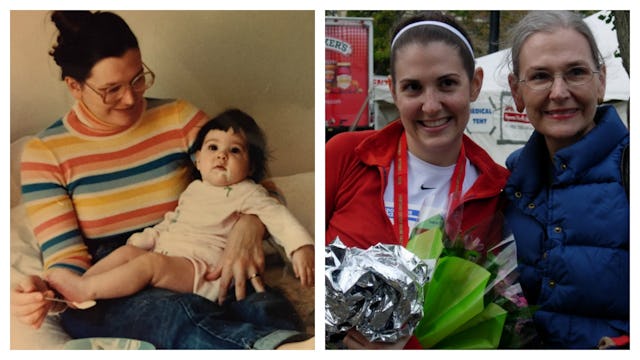Being A Mom, Without Your Mom

My daughter Eleanor arrived in 2010, three years after my mom died of pancreatic cancer. The second she showed up with her weird newborn mohawk and juicy cheeks, I was eager for her to know who my mom was, that she had existed and mattered and been so very real once. So I simply started talking the second I thought she might understand. But I never took a second to ponder what came after.
When Eleanor was five and I had already ruined her, my close friend Nina, a teacher with decades of experience, would give me the sagest advice I ever heard about speaking to kids about the super hard, very bad things. She told me that if kids ask a question, then you answer it honestly, but don’t force information on them before they’re ready.
Oops.
Around the age of three, Eleanor nonchalantly declared, “Your mom is dead!” while we stood in line for groceries at Trader Joe’s. I nodded confidently, attempting my best mom-who-has-her-shit-together impression. But then she followed up with “But where is she?” My mouth stumbled over words, trying to explain the differences in people who believe in heaven (my in-laws) and people who don’t (me). I tried to tell her that my mom believed in the laws of nature, above all, and if she looked hard she could find her there, somewhere between the branches, and the cracks of sunlight, and the smooth, green creases of leaves. It was the first of many such interrogations.
In my excitement to tell my daughter about this woman who was a part of her, a woman who would have loved her and her sister unfailingly with every fiber of her body, I created a kid who was just as excited to talk about how dead she was. “Your mom is never coming back, and you can’t hear her voice,” she announced in the car. “My grandmother is dead!” she declared to the UPS guy.
But despite all the badgering and the endless color commentary about death, it took her almost two years to ask the question. “Mom,” she said one day at the ripe old age of five, strapped into her car seat behind me on our drive home from school. “How did your mom die?”
“Her body got very sick,” I managed. “Not like when you get a cold. It’s a different kind of sick that won’t happen to you.”
“Liar!” my brain shouted as it flashed to all the Instagram accounts I follow documenting beautiful children and their cancer battles, with hashtags like #prayersforAshley and #Morgansfight.
“It mostly happens to grown-ups when they’re very old.” “That’s two for two!” my brain shouted again.
“Because she got sick her body stopped working.”
My brain finally shut up, and I hoped that this was enough — that she felt informed but also unafraid. Instead she loaded up her question gun and lobbed one more grenade at me.
“Is one day your body going to get sick and stop working?” she asked in her broken, preschooler English.
“Probably not,” I replied, defeated. I couldn’t bring myself to lie completely.
“But am I going to die?” she asked.
“Everything has a beginning, middle, and end,” I said. “Including our lives. But you’re just at the beginning. And the end won’t happen for a long time.”
She sat, quietly, chewing on my words. Finally, she piped up again: “Mom?”
I inhaled, preparing for the worst. “Yeah?”
“Can I roll down my window?”
I want my kids to know everything about my mom. I also want them to know that what happened to her won’t happen to me. But I can’t promise this. I can’t do anything. All I can do is fumble my way through the conversations, be open and honest when they ask questions, and gentle when they need reassurance. And in between this, I can help make the memories that they will share with their kids if I kick it at fifty-six. I scream too loud when they jump on the couch; I surprise them with Shopkins toy figurines even though they seriously perpetuate a culture of materialism and gender stereotypes; we go for walks every time it rains in Los Angeles, jumping so hard in the puddles that no rain boots can protect us.
We exist, which is the best we can do while we’re here.
Kate Spencer
Excerpted from The Dead Moms Club: A Memoir About Death, Grief, and Surviving the Mother of All Losses by Kate Spencer. Copyright © 2017. Available from Seal Press, an imprint of Perseus Books, LLC, a subsidiary of Hachette Book Group, Inc.